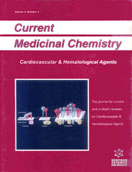Abstract
Despite recent advances in non-pharmacologic approaches antiarrhythmic drugs still play a dominant role in the treatment of cardiac arrhythmias. Large randomized controlled clinical trials have pointed out the importance of a proper benefit to risk evaluation in various patient subsets. This led to a continuous decline in the use of sodium channel blockers due to their possible proarrhythmic effects particularly in patients with reduced left ventricular function and ischemic heart disease. On the contrary, beta-blockers and more complex class III compounds such as sotalol and amiodarone have been prescribed increasingly. However, side effects commonly observed boosted the development of agents with simpler ion channel-blockade and less adverse reactions. In this review newer so-called“pure” class III agents will be discussed. Their common mechanism of action is an antifibrillatory effect both on the atrial and ventricular level. Clinically, they are used in the chemical cardioversion and the prevention of atrial fibrillation or atrial flutter as well as for the maintenance of sinus rhythm after its successful restoration. This report contains a detailed analysis of the pharmacokinetics, results of clinical studies and implications regarding the use in daily practice for three distinct compounds: ibutilide, dofetilide and azimilide. As efficacy is still limited their current and future role in hybrid therapies combining drug therapy with alternative treatment modalities (catheter ablation, pacemakers and implantable cardioverter defibrillators) is discussed. In addition, an outlook for a future drug design implementing changes in electrically remodeled atrial tissue will be given.
Keywords: arrhythmia, atrial fibrillation, ion channel blockers, nonpharmacologic treatment, drug therapy
 13
13













